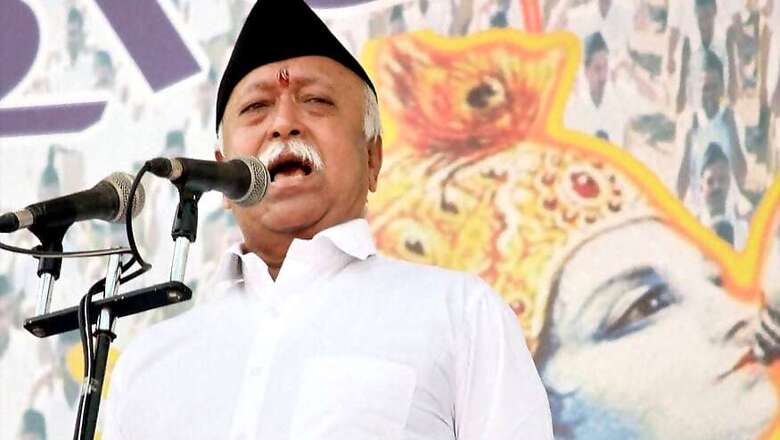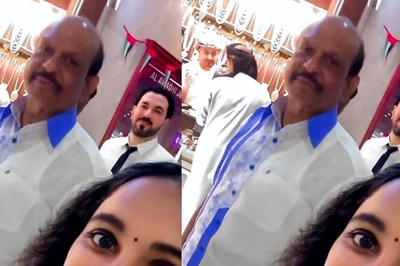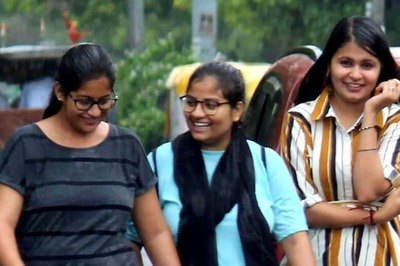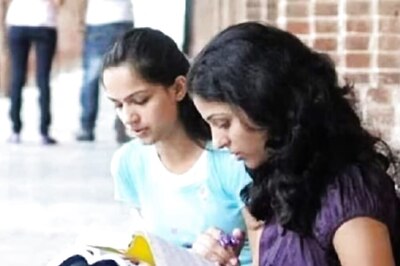
views
From time to time, the RSS finds it expedient to distance itself from the BJP. This is one of those occasions where both RSS numbers 1 & 2 have asserted that the party does not have a patent on Hindutva, nor is it the conscience-keeper of all Hindus.
'Hindutva' is an apolitical, overarching philosophy that cannot be framed in terms of electoral politics and communal polarisation. That, in sum, is the RSS message to the world in general and its own cadre in particular.
In a veiled reference to the BJP's recent electoral reverses, sarsanghchalak Mohan Rao Bhagwat observed that the party's defeat is not tantamount to a referendum on Hindutva. The remark echoed RSS No. 2 Suresh 'Bhaiyyaji' Joshi's observation, on the eve of the Delhi results, that the BJP was not synonymous with the Hindu community.
Strictly speaking, these remarks are in line with the long-held RSS maxim of equidistance from all political parties. Sarsangchalaks have always stressed that the only link between the RSS and BJP is organic, in the form of RSS pracharaks who are 'deputed' to the political wing.
In the context of recent events, the message obviously has deeper implications. Bhagwat's statement can be seen as a tactical readjustment. In the last few years, the BJP has served as a vehicle for the RSS agenda, the abrogation of Article 370 being a prime example. However, the perception of NDA II as an ideologically driven government helps neither RSS nor BJP.
The Sangh's global outreach campaign, during which the sarsanghchalak delivered a series of public lectures and interacted with the foreign media, in tandem with the Narendra Modi government's diplomatic efforts, is aimed at building up India's 'progressive' brand equity. The anti-CAA protest has been a setback, given widespread disapprobation of police action against protesting students.
Party sources say government was not in favour of green-lighting the CAA in the wake of the Ram Janmabhoomi judgment, but succumbed to pressure. As a result of the ensuing backlash, the Uniform Civil Code may well be deferred; the PM will not want to spend the rest of his term fire-fighting instead of concentrating on the economy.
The RSS will bide its time. Flexibility is its greatest strength. Witness Bhagwat, jettisoning provocative aspects of 'Guruji' Golwalker's thesis and bowing to Mahatma Gandhi. Witness the RSS standing firmly for the CAA, but, by distancing itself from the BJP, making the point that it does not dictate the government's agenda.
Left-wing triumphalists may read Bhagwat's and Joshi's statements as an attempt to buffer 'Hindutva' from the battering the BJP received in Delhi. Home minister Amit Shah's acknowledgement that his party's polarising rhetoric during the campaign hurt its prospects has added to that impression.
The reading is only partly correct. The RSS is not worried about a rollback of Hindutva. The very fact that AAP, a party that thrives on street campaigns, stayed away from the anti-CAA protests and that Chief Minister Arvind Kejriwal took care to project himself as a practising Hindu, is ample indication that Nehruvian secularism has gone into indefinite hibernation.
Nor is the RSS concerned that Kejriwal's 'Hindu' credentials will trump its own. The Delhi debacle was not a result of ideological one-upmanship, but of superior generalship — engaging the enemy on the field of AAP's choosing.
The crisis is within. By all accounts, the RSS leadership is disturbed at the over-politicisation of the Sangh Parivar and its over-dependence on the BJP. The 'BJPkaran' (or BJP-isation) of the swayamsevak carries an implicit threat of ideological dilution. Besides, the inevitable consequence of the party's prolonged stints in power at the Centre and in the states, is an inability to come to terms with a loss of power.
The Sangh Parivar survived and even thrived without political support for more than half a century. Today, every electoral defeat demoralises the RSS cadre, who technically have nothing to do with the BJP. Sources say Joshi's 'opposing BJP is not opposing Hindus' remark, delivered in Goa, came in the wake of interactions with the cadres in Madhya Pradesh, where the party has been out of power since 2018.
To some extent, the RSS leadership has only itself to blame. Until 2014, the RSS maintained a certain distance from the BJP, with swayamsevaks left to determine their own political affiliations. Those boundaries have been progressively blurred as the manifest advantages of an 'anukul' government (to use Bhagwat's word) became apparent. It also threw up the problem of managing the cadre's aspirations.
The symbiotic nature of the relationship between the mother organisation and its political wing has been emphasised. It is less spiritual and more functional, entailing a great deal of negotiation and give-and-take.
Reading between the lines, the cadre is being told that the BJP depends on the RSS and not vice-versa; the party is an adjunct and its electoral fortunes are of limited importance. The RSS project of social transformation will go on regardless, quietly and relentlessly, for as long as it takes.
(The author is a senior journalist. Views expressed are personal)




















Comments
0 comment